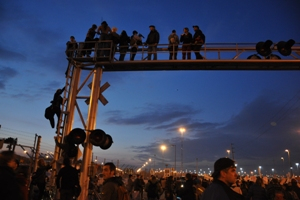West Coast Terminals Close

For the second time in a month, the Occupy movement called for mass action to shut down ports. This time, the occupiers targeted the entire West Coast.
The Occupy Oakland General Assembly unanimously adopted a proposal November 18 calling for the “blockade and disruption of the economic apparatus of the 1%” with a coordinated shutdown December 12 of ports coastwide. (General assemblies are open meetings that make decisions for Occupy groups.)
In Oakland, thousands of demonstrators picketing at 6 a.m. shut down two terminals where ships were waiting. When confronted with a picket line, members of the Longshore union (ILWU) have the right under their contract to stop work and call an arbitrator to rule on possible threats to safety.
The arbitrator ruled that union members were not required to cross, and they went home with four hours of “show-up” pay. Relations between demonstrators and longshore workers were cordial, as the occupiers helped those caught in traffic jams. No arrests were made, despite a large police presence.
Continuing demonstrations shut down the night shift and forced employers to cancel a 3 a.m. shift.
Mass pickets of hundreds shuttered two terminals in the Port of Portland during the day and night shifts. A hundred Occupy Longview, Washington, protesters halted daytime operations at their port, and a picket in Seattle blocked a terminal in the afternoon.
Canada’s Occupy Vancouver disrupted several terminals throughout the day and occupiers across the country held solidarity rallies.
Ernesto Nevarez, a port trucker organizer, said truckers at the giant Los Angeles and Long Beach ports stayed away for hours as nearly 1,000 marchers rallied at port gates.
FRICTION
The occupiers said their action was also in solidarity with ILWU members in Longview, in their struggle against grain terminal operator EGT. The company has refused to hire ILWU members, in a battle that has seen members from around the Northwest take over the port terminal and dump grain on railroad tracks.
Occupiers initially planned the shutdown without consulting with the ILWU, and the international released a statement December 6 disclaiming support for the action. “The ILWU has a long history of democracy,” wrote President Bob McEllrath. “Part of that historic democracy is the hard-won right to chart our own course to victory.”
The ILWU has a history of honoring community picket lines for good causes, but the question of how those actions are decided—and actually brought to bear against multinational employers—is a complicated matter.
Union and community members did person-to-person outreach to make the shutdown succeed.
The Oakland Education Association’s executive board backed the call; President Betty Olsen Jones leaftleted port truckers at 6 a.m. along with occupiers and union activists.
A largely immigrant workforce of “independent contractors” that move cargo in and out of the ports, the truckers are legally prevented from unionizing. Some criticized Oakland’s November 2 port shutdown because truckers were unprepared for the huge march and many were trapped for hours.

SUPPORT LABOR NOTES
BECOME A MONTHLY DONOR
Give $10 a month or more and get our "Fight the Boss, Build the Union" T-shirt.
Anthony Levierge of the Bay Area’s ILWU Local 10 and a half-dozen rank and filers passed out flyers to explain the shutdown to fellow members. “It’s been a mixed bag of attitudes,” he said.
ORIGIN: LOS ANGELES
The December 12 protest was initiated by Occupy Los Angeles, to coincide with immigrants’ rights activities around Our Lady of Guadalupe Day.
Sarah Knopp, a Los Angeles teacher, said occupiers decided to target SSA Marine, a terminal operator owned by Goldman Sachs.
SSA Marine is notorious for its environmental, labor, and human rights abuses and its exploitation of port truck drivers. Occupiers were also motivated by the firing of 27 port truckers who work for a separate firm, Toll Group. Those fired had worn Teamster shirts, part of a long-running campaign to beat the legal prohibitions on organizing.
The ports of Long Beach and Los Angeles take up 25 miles and handle 85 percent of all traffic on the West Coast, an operation too vast to blockade with the numbers protesters expected.
Knopp and fellow occupiers flyered outside an ILWU Local 13 membership meeting to build support. They received a “totally friendly reception,” she said.
SOLIDARITY WITH LONGVIEW
Some said the ILWU, which badly needs to beat the grain shipper EGT, was merely covering its legal bases by distancing itself from the shutdown.
The union has reason to fear legal reprisals resulting from an earlier injunction and contempt charges leveled by a federal judge. Fines for Local 21’s disruptions, blockades, and grain-dumping this summer have already totaled $315,000.
If a federal judge determines that occupiers are acting on the union’s behalf, said President Scott Mason of Local 23 in Tacoma, Washington, “we can be charged $5,000 for every incident.”
Still, Local 21 President Dan Coffman, who spoke to Occupy Oakland the day after it adopted the shutdown call, did not conceal his enthusiasm for the movement. Coffman cited the November 2 port shutdown as an inspiration to his members.
Supporters of Occupy and ILWU Local 21 are preparing for January, when a ship headed for Asia is scheduled to retrieve grain from the disputed elevator in Longview. An independently organized action could allow the ILWU to circumvent the legal minefield set in front of its own membership.
“We’re going to do whatever we can to stop that ship from being loaded,” Coffman vowed.
[Eduardo Soriano-Castillo contributed to this story from Oakland.]




